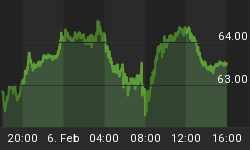From all outward appearances, it seems that a grim chapter in U.S. economic history has come to an end. Newsweek magazine declares that "America is Back," government statistics indicate revival, and our stock market has put in a rally for the record books (by rate of ascent, not highs - we are still more than 25% below the 2007 peak).
And yet, despite massive federal stimuli and subsidies, American unemployment clings stubbornly to the 10 per cent level, with the "underemployment" rate closer to 20 per cent. The IMF does not appear to buy into Washington's optimism; it projects a "double dip" contraction by the second half of this year. With so much conflicting sentiment, it is difficult for investors to know whether the cup is half-empty or half-full.
On a technical basis, stock market gains of 50 per cent or more in a twelve month period should indicate dangerous downside potential. On the other hand, the markets of early 2009 had priced in the likelihood of financial Armageddon. The meltdown did not happen, so traders and brave investors have been quickly buying up the deeply discounted equities.
However, many remain suspicious, believing that the catastrophe had been postponed rather than overcome. The vast bulk of investment funds are sitting on the sidelines, invested in fixed income despite historically low interest rates. Investors have also sought safety in gold, driving its price to above $1,000 an ounce or about half its inflation-adjusted peak price in 1980.
But as the stock market rally beginning in March '09 has extended through the summer, fall, winter and now spring, more and more investors are being drawn into the optimism. The carnage of October '08 may now seem to many like a distant memory -- or maybe just a bad dream.
Admittedly, the earnings of some American bellwether companies, such as IBM, Apple, and Yahoo, have come through far better than expected. More recently, the earnings of financial giants like Citigroup and Goldman Sachs (despite its ethical lapses and pending legal problems) have dazzled on the upside. The strong earnings are creating a drumbeat in the markets with a steady march higher. The results are buoyed by a strong surge of underlying consumer spending and government stimuli. However, no one seems to spend much thought on how the forces came about and how likely they are to remain.
Without doubt, some of the trillions of dollars thrown into the economy by the federal government are filtering through to consumer spending. In addition, an ever greater percentage of mortgage holders have decided to ignore their mortgage payments and condo maintenance obligations. The sudden windfall of extra cash has pumped up spending. But is this a measure of real economic recovery?
Fed Chairman Ben Bernanke says the economy is stable. Many people believe him. But, at the same time as he advertises economic recovery, Bernanke tells us that short-term Fed rates will be kept at zero "for an extended period." Why would he risk runaway inflation by holding interest rates down if the economy were truly rebounding?
Furthermore, despite creating and spending these trillions of new dollars, the Fed continues to resist heavy Congressional pressure to show the public where the money has gone. Rumor has it that some of the money went to institutions outside America. In today's world, can we trust the central bank?
Government pronouncements and the Wall Street media have been castigating Greece for prolific spending and false accounting. Other nations such as Ireland, Spain and Portugal are considered pending dangers to the international monetary system. The fact is that, based on deficit to GDP ratios, the UK (12.6%) lies third behind Iceland (15.7%) and Greece (12.7%)! The United States (10.6%) lies sixth behind Ireland (12.2%) and Spain (11.4%)! The risk of an international meltdown is no longer restricted to banks. It now threatens entire nations, including the great powers. The price of gold reflects just a part of this risk.
Unfortunately, the economic position of the United States and the member states of the European Union, excluding Germany, is not as healthy as our media and politicians would have us believe. The danger is even greater when measured against the relative security and economic success of China, India, Brazil, Australia, Canada and New Zealand (BIC-CAN). In such countries, economic growth and financial responsibility are real. At home, I'm afraid the reports of our recovery are greatly exaggerated.
For in-depth analysis of this and other investment topics, subscribe to The Global Investor, Peter Schiff's free online newsletter. Click here for more information.















